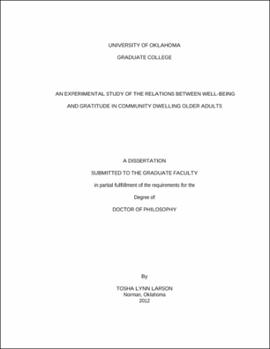| dc.description.abstract | This study examined the effects of maintaining gratitude journals on the well-being of a population of community dwelling older adults. Well-being was measured by pre- and post-test administrations of self-report questionnaires designed to gauge satisfaction of life, hope, happiness, depressive symptoms, health status, health depression, and internal health control. An experimental group maintained daily gratitude journals, recording what they were thankful for, while a control group maintained journals in which they recorded their daily events. Each participant maintained their randomly assigned journal for two weeks before completing post-test questionnaires. The hypothesis that well-being would improve over the two week time period received little support. While participants in the gratitude condition reported increased satisfaction of life, none of the other measures of well-being showed statistically significant change from pre- to post-test. | |
